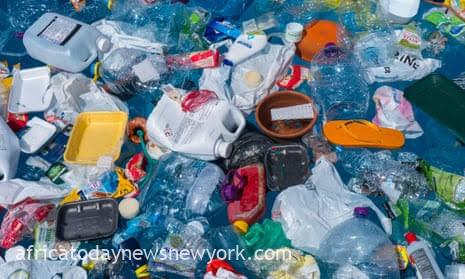The Lagos State government, as of yesterday, has implemented a ban on the usage and distribution of styrofoam and other single-use plastics with immediate effect.
The decision to ban the use and distribution of single-use plastics, especially the environmentally harmful non-biodegradable Styrofoam, was announced by Tokunbo Wahab, the Commissioner for the Environment and Water Resources. He personally signed the statement, highlighting the environmental challenges associated with these materials.
Wahab highlighted that despite regular and extensive cleaning efforts, the state’s drainage channels faced daily blockages due to the indiscriminate distribution and use of styrofoam, necessitating urgent action.
Wahab reiterated that the primary littering issue confronting LAWMA on a daily basis, notably across major roads and markets, was largely attributed to styrofoam. This highlights the critical need for targeted interventions.
The commissioner emphasized that the state government couldn’t idly witness the ongoing environmental degradation. Consequently, he instructed the State Waste Management Authority (LAWMA) and Kick Against Indiscipline (KAI) to promptly initiate the enforcement of the ban.
Tasking the two agencies with a clear directive, he instructed them to clamp down on all production companies and distribution outlets for styrofoam in the state to prevent any additional distribution.
Read also: People Still Want Plastic Bottles, Says Coca-Cola
Wahab clarified that the state’s current action is grounded in various enabling laws and regulations, notably the National Environmental (Sanitation and Waste Control) Regulation 2009. Established pursuant to the NESREA Act, these regulations prohibit single-use plastic in the country, although enforcement has been lacking.
According to Wahab, additional laws supporting the action include the 2017 State Environmental Management and Protection Law, which, under section 56(I) (y), empowers the prevention, cessation, or discontinuation of any activity likely to cause harm to human health or the environment.
Producers, distributors, and end-users of styrofoam packs were cautioned by the commissioner to take the ban seriously, urging them to seek alternatives or face significant fines and penalties, including the sealing of their premises.
He cautioned that they might also be held accountable for the expenses related to the daily cleanup of their products from roads and drainage channels, which amounts to tens of millions of naira every day.
‘Our state cannot be held hostage to the economic interests of a few wealthy business owners, compared to the millions of Lagosians suffering the consequences of indiscriminate dumping of single use plastics and other types of waste,’ he stated.
According to Wahab, the well known consequence include climate change, flooding, and diseases like cholera.
He advised consumers and residents to boycott styrofoam packs and single use plastics and imbibe the practice of using reusable food containers and water bottles for their food and drinks. ‘The convenience of single use plastic comes at a huge cost to the society. We must all make small sacrifices for our collective well-being,’ Wahab pleaded.

